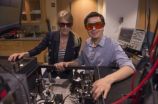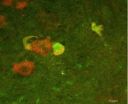(Press-News.org) MADISON, Wis. — A team of researchers at the University of Wisconsin-Madison has identified the genes and enzymes that create a promising compound — the 19 carbon furan-containing fatty acid (19Fu-FA). The compound has a variety of potential uses as a biological alternative for compounds currently derived from fossil fuels.
Researchers from the Great Lakes Bioenergy Research Center (GLBRC), which is headquartered at UW-Madison and funded by the U.S. Department of Energy, discovered the cellular genomes that direct 19Fu-FA's synthesis and published the new findings Aug. 4 in the journal Proceedings of the National Academy of Sciences.
"We've identified previously uncharacterized genes in a bacterium that are also present in the genomes of many other bacteria," says Tim Donohue, GLBRC director and UW-Madison bacteriology professor. "So, we are now in the exciting position to mine these other bacterial genomes to produce large quantities of fatty acids for further testing and eventual use in many industries, including the chemical and fuel industries."
The novel 19Fu-FAs were initially discovered as "unknown" products that accumulated in mutant strains of Rhodobacter sphaeroides, an organism being studied by the GLBRC because of its ability to overproduce hydrophobic, or water-insoluble, compounds. These types of compounds have value to the chemical and fuel industries as biological replacements for plasticizers, solvents, lubricants or fuel additives that are currently derived from fossil fuels. The team also provides additional evidence that these fatty acids are able to scavenge toxic reactive oxygen species, showing that they could be potent antioxidants in both the chemical industry and cells.
Cellular genomes are the genetic blueprints that define a cell's features or characteristics with DNA. Since the first genome sequences became available, researchers have known that many cells encode proteins with unknown functions according to the instructions specified by the cell's DNA. But without known or obvious activity, the products derived from these blueprints remained a mystery.
As time has gone on, however, researchers have realized that significant pieces of these genetic blueprints are directing the production of enzymes — proteins that allow cells to build or take apart molecules in order to survive. These enzymes, it turned out, create new and useful compounds for society.
"I see this work as a prime example of the power of genomics," Donohue says. "It is not often that one identifies genes for a new or previously unknown compound in cells. It is an added benefit that each of these compounds has several potential uses as chemicals, fuels or even cellular antioxidants."
A cross-disciplinary, collaborative effort between GLBRC chemists, biochemists and bacteriologists in departments at UW-Madison and Michigan State University yielded the chemical identity of the fatty acid compounds and identified the specific genes that direct their synthesis in bacteria.
"I don't think this discovery would have been possible," says Rachelle Lemke, the paper's lead author and a research specialist in Donohue's lab, "without the analytical and intellectual expertise of the members from this center."
INFORMATION: Eric Anderson
eanderson@energy.wisc.edu
608-890-0105
Researchers uncover novel process for creation of fuel and chemical compounds
2014-08-05
ELSE PRESS RELEASES FROM THIS DATE:
Baby aspirin? Many doctors don't recommend, despite guidelines
2014-08-05
A majority of middle-aged men and women eligible to take aspirin to prevent heart attack and stroke do not recall their doctors ever telling them to do so, according to a University of Rochester study of a national sample of more than 3,000 patients.
Published online by the Journal of General Internal Medicine, the finding illustrates a common disconnect between public health guidelines and what occurs in clinical practice. The UR study is consistent with other research showing that physicians often do not recommend aspirin as prevention therapy to the general population, ...
Pistachios may lower vascular response to stress in type 2 diabetes
2014-08-05
Among people with type 2 diabetes, eating pistachios may reduce the body's response to the stresses of everyday life, according to Penn State researchers.
"In adults with diabetes, two servings of pistachios per day lowered vascular constriction during stress and improved neural control of the heart," said Sheila G. West, professor of biobehavioral health and nutritional sciences. "Although nuts are high in fat, they contain good fats, fiber, potassium and antioxidants. Given the high risk of heart disease in people with diabetes, nuts are an important component of a ...
Watching chemistry in motion: Chemical environments mapped using molecular vibrations
2014-08-05
Scientists have long known that a molecule's behavior depends on its environment. Taking advantage of this phenomenon, a group of researchers at the University of Chicago developed a new technique to map microscopic environments using the vibrations of molecules.
"It's a special new advance that will be broadly useful in studies of molecular and materials phenomena," said Andrei Tokmakoff, the Henry G. Gale Distinguished Service Professor in Chemistry at UChicago. He and two of his associates report their new technique in a paper published online in the journal Optics ...
Physicists eye neural fly data, find formula for Zipf's law
2014-08-05
Physicists have identified a mechanism that may help explain Zipf's law – a unique pattern of behavior found in disparate systems, including complex biological ones. The journal Physical Review Letters is publishing their mathematical models, which demonstrate how Zipf's law naturally arises when a sufficient number of units react to a hidden variable in a system.
"We've discovered a method that produces Zipf's law without fine-tuning and with very few assumptions," says Ilya Nemenman, a biophysicist at Emory University and one of the authors of the research.
The ...
'Treatments waiting to be discovered' inside new database
2014-08-05
Your genes are blueprints for proteins, and molecules called microRNA can help to determine how often these genetic blueprints are manufactured into proteins. Researchers often ask what microRNA regulates a gene related to disease. Or what gene is regulated by a microRNA found in sick patients? The answers to these questions could help doctors and researchers manipulate protein levels in the body that cause disease, especially cancer. A University of Colorado Cancer Center study recently published in the top-ranked journal Nucleic Acids Research (NAR) describes a database ...
Monthly preventative treatment with a new drug combination reduces malaria in children
2014-08-05
Preventative treatment with a monthly dose of a newer antimalarial drug can reduce the risk of malarial infection among young children, according to a study published in this week's PLOS Medicine. The study, conducted by Victor Bigira and colleagues at San Francisco General Hospital and the Makerere University College of Health Sciences in Kampala, Uganda, finds that treating young children with dihydroartemisinin-piperaquine (DP) decreased their risk of contracting malaria.
Preventative treatment of malaria is a useful strategy to protect young children in Africa, but ...
Pregnant women are often given inappropriate treatment for malaria
2014-08-05
Not all pregnant women with symptoms of malaria seek care from their formal healthcare system and if they do seek care, they may be given inappropriate treatment because healthcare providers often fail to adhere to the standard (World Health Organization-WHO) diagnostic and treatment guidelines, according to a study by UK researchers published in this week's PLOS Medicine.
The authors (led by Jenny Hill from the Liverpool School of Tropical Medicine) reached these conclusions by reviewing all relevant studies that investigated the factors that affect pregnant women's ...
A campaign involving Muslim clerics has increased uptake of polio vaccination in Nigeria
2014-08-05
A coalition campaign involving imams, Islamic school teachers, traditional rulers, doctors, journalists, and polio survivors is gradually turning the tide against polio vaccine rejection in northern Nigeria, according to experts from Nigeria writing in this week's PLOS Medicine.
Sani-Gwarzo Nasir (from the Federal Ministry of Health in Nigeria) and colleagues describe how anti-polio propaganda, misconceptions, and violence against vaccinators present huge challenges to polio eradication in Nigeria but perhaps most profound is the rejection of vaccination by Muslim clerics.
However, ...
Just one simple question can identify narcissistic people
2014-08-05
COLUMBUS, Ohio – Scientists have developed and validated a new method to identify which people are narcissistic: just ask them.
In a series of 11 experiments involving more than 2,200 people of all ages, the researchers found they could reliably identify narcissistic people by asking them this exact question (including the note):
To what extent do you agree with this statement: "I am a narcissist." (Note: The word "narcissist" means egotistical, self-focused, and vain.)
Participants rated themselves on a scale of 1 (not very true of me) to 7 (very true of me).
(How ...
Salk scientists uncover new clues to repairing an injured spinal cord
2014-08-05
LA JOLLA—Frogs, dogs, whales, snails can all do it, but humans and primates can't. Regrow nerves after an injury, that is—while many animals have this ability, humans don't. But new research from the Salk Institute suggests that a small molecule may be able to convince damaged nerves to grow and effectively rewire circuits. Such a feat could eventually lead to therapies for the thousands of Americans with severe spinal cord injuries and paralysis.
"This research implies that we might be able to mimic neuronal repair processes that occur naturally in lower animals, which ...

